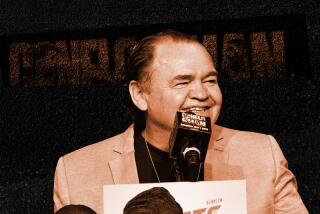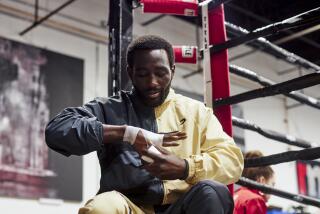Reilly Stayed In at Night, Then He Made His Day
- Share via
BARCELONA — The nimble hands that made the jump-rope smack against the floor and the speed bag in the gymnasium go whoppa-da, whoppa-da picked a poor time to betray Pepe Reilly. His new slacks and jacket for the Olympic opening ceremony were spread out neatly on the bed, but the fingers of the Glendale welterweight fumbled unsteadily with the shirt buttons and he was struggling with the necktie when Joe Byrd dropped by.
“Help me with this,” he said.
“What for?”
“I can’t get it tied.”
Byrd, the U.S. boxing coach, reached out with both hands to tweak the knot, then placed a palm on the 20-year-old’s shoulder paternally and said: “Pepe, you ain’t going.”
Pepe’s face fell. He had been looking forward to marching in the parade of athletes, a parade far more meaningful to him than that famous one on New Year’s Day near his hometown. It was something he thought about eight years ago in Los Angeles, when he watched Evander Holyfield and the other Olympic boxers on TV and told himself: “I could do that.” It was what saddened him at 16 at the U.S. Olympic trials, when only the crisp punches of Michael Carbajal had kept him from making the team.
“What do you mean, I’m not going?” Pepe asked.
The coach explained that the schedule for Sunday’s opening-round bouts had been revised at virtually the last minute. Byrd really did feel a fatherly pang of sympathy because it was his own son, middleweight Chris Byrd, whose first-round fight had been rescheduled, and because as handler of all the Olympians he had usurped the role of Pepe’s previous coach and trainer, Fred Reilly, the boy’s father.
Needing to put up his dukes the next afternoon against a feisty 147-pounder from Spain, who would further enjoy the advantage of a home crowd’s support, Reilly could not risk fatigue by spending a three-hour ceremony on his feet. Furthermore, Byrd didn’t want his fighter melting away two or three pounds in the outdoor sauna that is Barcelona’s climate.
So, Pepe replaced his clothes on their hangers and dutifully did the most difficult thing a youngster can do--went went to bed early on a Saturday night.
He was anxious by the time he got to Pavello Club Joventut Badalona for the fight of his life. The meat-locker chill of excessive air conditioning in the tiny back-street arena was not an unpleasant surprise, but because everything that had motivated Pepe over the past eight years would be on the line, his nerves still left him in a cold sweat.
He had come a long way to get this far, and not merely 8,000 miles. There had been the thrill of victory in the 1991 national amateur championships, followed by the heartbreak and shame of being stripped of his standing because of a positive test for Nandrolone, an anabolic steroid.
Pepe and his father protested vehemently, while forever regretting the day a family friend and boxing trainer injected the fighter with what he described as a legal dose of vitamin. Although eventually he accepted his nine-month suspension as a fact of life, Pepe said: “I never would have taken such a thing, never, ever.”
There was little that the Reillys could say or do to persuade boxing authorities that anything else could have been responsible for the boxer’s buffing from a scrawny 119-pound bantamweight in 1990 to the filled-out 147-pounder he had become within 12 months’ time. Any arguments posed that Pepe’s additional bulk was related directly to his rise in height to nearly 6 feet mostly fell on deaf ears. His reputation suffered.
The only means Reilly had of making it to the Olympics was to circumvent his way to the trials by winning a regional tournament at the Lincoln Park, which he did, and then the national Golden Gloves in Chicago, which he did. As Pepe put it: “I trained hard nine months for that one chance.”
His father, who counseled Pepe on the science of body-punching, was furious when his son momentarily was suckered into a slugfest at the Golden Gloves final, but Pepe prevailed. Then he vanquished all the competition at the Olympic Trials as well, which brought him to this sunny Sunday in Spain and a stare-down with a brave, snorting little bull named Victor Manuel Baute Montanez.
Lethargic first rounds were Reilly’s undoing from time to time, so he was eager to come out swinging. Besides, there were important people in the stands to impress, his father being one, Evander Holyfield being another. That was why Pepe raised both arms in excitement after rocking Baute for a standing-eight count with 1:15 remaining in the first round, then popped him again, hard, with a left hook a half-minute later.
He was locked and loaded, in total control, leading on points, 12-1, after one round. That’s when Pepe got careless. He got gouged in the eye by the Spaniard’s first punch of the second round, unwisely permitted himself to be pinned against the turnbuckle, then got pummeled into a standing-eight by Baute, who fought bent forward with his head bobbing like a bull in search of someone to gore.
“I’m hurt, I’m hurt,” Reilly said on his stool between rounds.
“Get out of that corner!” Byrd yelped at his fighter, dabbing at a left eyelid that had puffed like a blister. “Two of them three judges can’t even you from that angle! You want to lose this fight on points?”
What the coach understood was that Reilly’s lack of international fight experience was telling, as was his understandable eagerness to slug things out. Byrd begged him to relax. The score after two rounds was 18-6. The Spaniard still needed a knockout.
Overeager himself, Baute the bull charged again. Reilly, with one good eye, saw him coming and whacked him one. When the Spaniard swayed, the referee, Reyaldo Fortalea from the Philippines, stepped between the fighters and began another eight-count, Baute said something that translates offensively in almost any language. He promptly got disqualified.
Relieved, Reilly said he was grateful that he can rest up for the next several days before fighting again. “That little bull was strong,” he said.
He squinted through the swollen eye. As long as he was still in the Olympics, Pepe said, he never felt better.
More to Read
Go beyond the scoreboard
Get the latest on L.A.'s teams in the daily Sports Report newsletter.
You may occasionally receive promotional content from the Los Angeles Times.






